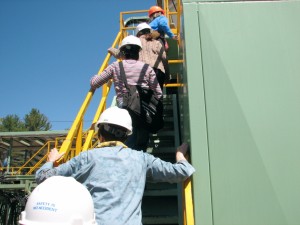
UNIVERSITY PARK – Bringing together one of the largest contingents of natural gas experts in the United States, Penn State has established an Institute for Natural Gas Research (INGaR), which is expected to provide much-needed study into this important form of energy. Working closely with industry, and state and federal government partners, members of INGaR will conduct independent and rigorous scientific research in the broad area of natural gas. Through the institute, researchers and students will develop interdisciplinary approaches to study the complex processes involved in natural gas exploration, production, transmission, storage, processing, combustion, infrastructure and water transport, usage and impact.
A major goal of the institute is to support the ongoing development of a natural gas-based economy that will allow the country to eventually consume a predominantly domestic supply of gas for many years to come. The U.S. Energy Information Administration projects U.S. natural gas production will increase 44 percent by 2040.
INGaR is a collaborative effort between two of Penn State’s colleges: Earth and Mineral Sciences and Engineering. Currently, more than 50 faculty members in various departments at Penn State have significant research interests and active research programs in natural gas and related areas. Over the next four years, 12 new faculty members will be hired to further strengthen key areas and produce the needed joint information and knowledge that will solve some of the complex challenges related to the exploration and use of natural gas. While the prospects for shale gas production are promising, particularly in Pennsylvania, there remains considerable uncertainty regarding various aspects of this resource and its overall impact, including environmental concerns.
Through INGaR, Penn State can lead the nation in world-class expertise in natural gas that can help Pennsylvania retain a strong competitive advantage in natural gas for decades to come. This will translate into more high-paying jobs and a stronger state economy. It also provides novel solutions to environmental management and water resources challenges in mining shale gas.
Penn State has a long history of providing strong scientific service to Pennsylvania on myriad matters of economic importance, including natural gas science and engineering. In fact, in 2010 Penn State established the Marcellus Center for Outreach and Research (MCOR) to specifically look at unconventional gas plays and their impacts. MCOR will continue to play a crucial role for Penn State by informing stakeholders on important matters concerning the Marcellus Shale play. MCOR will partner with INGaR to provide the most comprehensive body of expertise on natural gas, especially the Marcellus play, in any university.
In areas across the University, Penn State energy researchers are supported by various agencies interested in natural gas. The Ben Franklin Technology Partners of Pennsylvania is supporting the development of smart proppant materials used in fracking to keep gas flowing through shale fractures. The U.S. Department of Energy is funding research that characterizes rock mechanics, including induced seismicity, in gas reservoirs under stimulation. Quantum Reservoir Impact, a Houston-based company, is supporting research on the design and implementation of advanced well structures to investigate the possibility of producing natural gas and liquids from unconventional reservoirs without hydraulic fracturing. In a recent study for the Pennsylvania Turnpike Commission, the feasibility and possible locations of liquefied natural gas fueling stations were examined for long-haul commercial vehicles. Those are just a few of the many sponsored research projects that will continue under INGaR.
Several companies in Pennsylvania and elsewhere have pledged support for INGaR, with gifts for laboratory renovations totaling $2 million to date, with more expected.
“INGaR will have the depth and breadth of expertise to tackle comprehensive problems encountered in the exploration, drilling, transport and use of natural gas, including the environmental challenges of extraction,” said William E. Easterling, dean of the College of Earth and Mineral Sciences.
INGaR will be co-directed by Turgay Ertekin, professor of petroleum and natural gas engineering, and Andrew Zydney, professor of chemical engineering, during an international search for a permanent director. INGaR will be overseen by an external advisory board consisting of academic, government and industry experts who will help guide INGaR research toward topics that provide maximum benefit to companies; promote scientific excellence; and help educate the public on the facts of natural gas.


